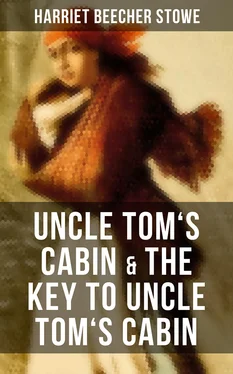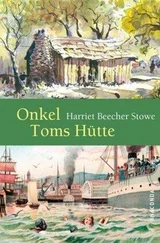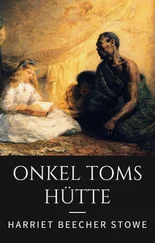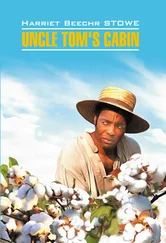Miss Ophelia thought she had said enough, and therefore sat silent. St. Clare whistled a tune.
"St. Clare, I wish you wouldn't whistle," said Marie; "it makes my head worse."
"I won't," said St. Clare. "Is there anything else you wouldn't wish me to do?"
"I wish you would have some kind of sympathy for my trials; you never have any feeling for me."
"My dear accusing angel!" said St. Clare.
"It's provoking to be talked to in that way."
"Then, how will you be talked to? I'll talk to order,—any way you'll mention,—only to give satisfaction."
A gay laugh from the court rang through the silken curtains of the verandah. St. Clare stepped out, and lifting up the curtain, laughed too.
"What is it?" said Miss Ophelia, coming to the railing.
There sat Tom, on a little mossy seat in the court, every one of his button-holes stuck full of cape jessamines, and Eva, gayly laughing, was hanging a wreath of roses round his neck; and then she sat down on his knee, like a chip-sparrow, still laughing.
"O, Tom, you look so funny!"
Tom had a sober, benevolent smile, and seemed, in his quiet way, to be enjoying the fun quite as much as his little mistress. He lifted his eyes, when he saw his master, with a half-deprecating, apologetic air.
"How can you let her?" said Miss Ophelia.
"Why not?" said St. Clare.
"Why, I don't know, it seems so dreadful!"
"You would think no harm in a child's caressing a large dog, even if he was black; but a creature that can think, and reason, and feel, and is immortal, you shudder at; confess it, cousin. I know the feeling among some of you northerners well enough. Not that there is a particle of virtue in our not having it; but custom with us does what Christianity ought to do,—obliterates the feeling of personal prejudice. I have often noticed, in my travels north, how much stronger this was with you than with us. You loathe them as you would a snake or a toad, yet you are indignant at their wrongs. You would not have them abused; but you don't want to have anything to do with them yourselves. You would send them to Africa, out of your sight and smell, and then send a missionary or two to do up all the self-denial of elevating them compendiously. Isn't that it?"
"Well, cousin," said Miss Ophelia, thoughtfully, "there may be some truth in this."
"What would the poor and lowly do, without children?" said St. Clare, leaning on the railing, and watching Eva, as she tripped off, leading Tom with her. "Your little child is your only true democrat. Tom, now is a hero to Eva; his stories are wonders in her eyes, his songs and Methodist hymns are better than an opera, and the traps and little bits of trash in his pocket a mine of jewels, and he the most wonderful Tom that ever wore a black skin. This is one of the roses of Eden that the Lord has dropped down expressly for the poor and lowly, who get few enough of any other kind."
"It's strange, cousin," said Miss Ophelia, "one might almost think you were a professor, to hear you talk."
"A professor?" said St. Clare.
"Yes; a professor of religion."
"Not at all; not a professor, as your town-folks have it; and, what is worse, I'm afraid, not a practiser, either."
"What makes you talk so, then?"
"Nothing is easier than talking," said St. Clare. "I believe Shakespeare makes somebody say, 'I could sooner show twenty what were good to be done, than be one of the twenty to follow my own showing.'* Nothing like division of labor. My forte lies in talking, and yours, cousin, lies in doing."
* The Merchant of Venice, Act 1, scene 2, lines 17-18.
In Tom's external situation, at this time, there was, as the world says, nothing to complain of Little Eva's fancy for him—the instinctive gratitude and loveliness of a noble nature—had led her to petition her father that he might be her especial attendant, whenever she needed the escort of a servant, in her walks or rides; and Tom had general orders to let everything else go, and attend to Miss Eva whenever she wanted him,—orders which our readers may fancy were far from disagreeable to him. He was kept well dressed, for St. Clare was fastidiously particular on this point. His stable services were merely a sinecure, and consisted simply in a daily care and inspection, and directing an under-servant in his duties; for Marie St. Clare declared that she could not have any smell of the horses about him when he came near her, and that he must positively not be put to any service that would make him unpleasant to her, as her nervous system was entirely inadequate to any trial of that nature; one snuff of anything disagreeable being, according to her account, quite sufficient to close the scene, and put an end to all her earthly trials at once. Tom, therefore, in his well-brushed broadcloth suit, smooth beaver, glossy boots, faultless wristbands and collar, with his grave, good-natured black face, looked respectable enough to be a Bishop of Carthage, as men of his color were, in other ages.
Then, too, he was in a beautiful place, a consideration to which his sensitive race was never indifferent; and he did enjoy with a quiet joy the birds, the flowers, the fountains, the perfume, and light and beauty of the court, the silken hangings, and pictures, and lustres, and statuettes, and gilding, that made the parlors within a kind of Aladdin's palace to him.
If ever Africa shall show an elevated and cultivated race,—and come it must, some time, her turn to figure in the great drama of human improvement.—life will awake there with a gorgeousness and splendor of which our cold western tribes faintly have conceived. In that far-off mystic land of gold, and gems, and spices, and waving palms, and wondrous flowers, and miraculous fertility, will awake new forms of art, new styles of splendor; and the negro race, no longer despised and trodden down, will, perhaps, show forth some of the latest and most magnificent revelations of human life. Certainly they will, in their gentleness, their lowly docility of heart, their aptitude to repose on a superior mind and rest on a higher power, their childlike simplicity of affection, and facility of forgiveness. In all these they will exhibit the highest form of the peculiarly Christian life, and, perhaps, as God chasteneth whom he loveth, he hath chosen poor Africa in the furnace of affliction, to make her the highest and noblest in that kingdom which he will set up, when every other kingdom has been tried, and failed; for the first shall be last, and the last first.
Was this what Marie St. Clare was thinking of, as she stood, gorgeously dressed, on the verandah, on Sunday morning, clasping a diamond bracelet on her slender wrist? Most likely it was. Or, if it wasn't that, it was something else; for Marie patronized good things, and she was going now, in full force,—diamonds, silk, and lace, and jewels, and all,—to a fashionable church, to be very religious. Marie always made a point to be very pious on Sundays. There she stood, so slender, so elegant, so airy and undulating in all her motions, her lace scarf enveloping her like a mist. She looked a graceful creature, and she felt very good and very elegant indeed. Miss Ophelia stood at her side, a perfect contrast. It was not that she had not as handsome a silk dress and shawl, and as fine a pocket-handkerchief; but stiffness and squareness, and bolt-uprightness, enveloped her with as indefinite yet appreciable a presence as did grace her elegant neighbor; not the grace of God, however,—that is quite another thing!
"Where's Eva?" said Marie.
"The child stopped on the stairs, to say something to Mammy."
And what was Eva saying to Mammy on the stairs? Listen, reader, and you will hear, though Marie does not.
"Dear Mammy, I know your head is aching dreadfully."
"Lord bless you, Miss Eva! my head allers aches lately. You don't need to worry."
Читать дальше












